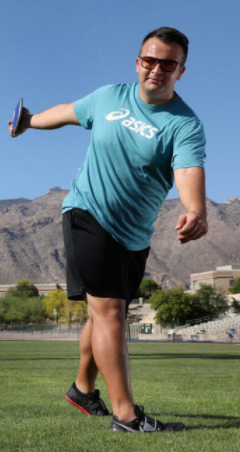September 3, 2021

The Paralympic Games started shortly after the Olympic Games ended and showcased some of the world’s top athletes who live with disabilities. One team competing in the games is the six-person Refugee Paralympic Team, which includes Iranian-born discus thrower Shahrad Nasajpour.
A refugee now living in Arizona, he was born with cerebral palsy.
At the Tokyo Games, Nasajpour ended up eighth in his category.
Nasajpour says he wasn’t thrilled by the idea of throwing a discus when he was first introduced to it.
“I didn’t like it that much because it was hard to spin the discus,” he says. “It’s all about technique, it’s from your toes to your fingers. I didn’t like it because I couldn’t throw well.”
But Nasajpour was determined while still in Iran and continued to practice throwing discus at a training camp he was referred to, he says. It took him a few weeks to learn the basics of the throwing sport, but he eventually found enjoyment in it.
Nasajpour became so good at throwing that he traveled to two international competitions with an Iranian team in 2011, he says. Eventually, he left the team in 2015 and fled Iran to seek asylum in the US.
“One of the reasons I left was because I was deprived of [being a part of] the [Iranian] national team because I didn’t comply with the religious stuff on the team,” Nasajpour says.
The Iranian team was strict about its rules and required its players to attend mosque services, he says.
Nasajpour came to value the freedom to express one’s political, social or religious views when he moved to the US. He found that being recognized for your work as an athlete is what mattered most in the game.
“I think that making the Team USA for Special Olympics is the hardest [thing] in the world because everyone going for trials is at least in the top eight in the world,” Nasajpour says. “But at the end of the day, only three people will make the team. So, it means performance mattered nothing else.”
And just like any other athlete, Nasajpour experiences the limits of human strength. To adapt to this, he says it’s important for him to recognize his weak points and focus on using the stronger points of his body. But sometimes, he says he thinks athletes have to go beyond that to reach their fullest potential.
“We have to push our limits, we don’t need to think about it,” Nasajpour says. “If your mindset is ‘I cannot do that,’ or, ‘This is my limit,’ you cannot progress much in your life.”
Other adjustments Nasaj-pour has had to make in his life include the ways he stays in touch with his family in Iran. And although he’s grateful for messaging apps that have allowed him to communicate with his family, he says fleeing to the US alone has been a difficult experience.
“I have to look out for everything,” Nasajpour says. “You have nobody to have your back when you live alone. You have no family. Of course, we make friends, but you have to watch for everything by yourself. It makes [life] harder.”
But he has a special message for the 80 million refugees in the world today who have been forced to flee their homes: “Be resilient in difficult times. You will hear a lot of no’s on a regular basis, but don’t take that no as an answer,” he says.
Nasajpour says he hopes to earn US citizenship status in less than two years and then a spot on Team USA.
